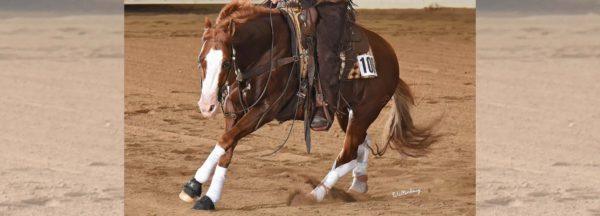Proper Hydration Increases Performance and Maintains Health

By Ritchie Industries
The power and grace of the American Quarter Horse performing the demands of equine athletics such as rodeo events, reining and cutting is undeniable. Quarter Horses are amazing equine athletes – able to stop on a dime, run a blistering quarter mile, jump over 5 feet in height and demonstrate discipline through dressage. Hours and hours of training and preparation are required to develop these equine athletes for peak performance. With all the resources and technology dedicated to improving the performance of both horse and rider, it can be easy to overlook one of the simplest core metrics – proper hydration.
Simple Equation – Water Intake Must Equal Water Loss
Horses in training or at competitions can lose a lot of water simply due to sweating, especially in hot and humid conditions. As horses begin to work, heat is produced as a by-product of muscle contraction at a 4:1 ratio according to Brianne Henderson, D.V.M. at Equine Guelph, University of Guelph in Ontario, Canada. During heavy workloads, horses can lose between 2 to 4 gallons per hour in sweat. Once the horse’s body temperature reaches 107.6 F, horses start to breathe faster to dissipate extra body heat. Approximately 15% of the excess body temperature can be moderated through this process.
Make sure to offer horses plenty of fresh, clean water before, during and after workouts or competitions. It is important to remember that horses tend to drink in brief periods (10 to 60 seconds) up to 20 times a day.
A Dehydrated Horse is a Depleted Horse
A horse is clinically dehydrated when they lose 5% of their body mass (around 5 to 6.5 gallons for average sized horses). At this point you will notice a marked decrease in performance. Research on the precise impact on performance in equine athletes is limited, but let’s take a moment to consider how even slight dehydration affects the human athlete.
According to the Sport Nutrition 2nd Edition textbook by Jeukendrrup and Gleeson, athletes that are slightly dehydrated with a 2% loss of body mass experience a decrease in performance of 30%. Athletes performing high intensity exercise can see their capacity drop by 45% once they hit a 2.5% reduction of body mass through dehydration. This can occur even in cooler temperatures.
Dehydration in both people and horses can impact performance by causing:
- Reduction in blood volume.
- Decreased skin blood flow.
- Decreased sweat rate.
- Decreased heat dissipation.
- Increased core temperature.
- Increased rate of muscle glycogen use.
Hydration Game Plan
Managing the hydration needs of equine athletes before, during and after training and competitions doesn’t have to be complicated. There are a few keys areas to zero in on:
- Plan to provide cool, fresh water on demand to horses. When you are transporting horses to a show or event, plan to stop every two to four hours to let the horses drink. At your facility, consider using insulated automatic waterers to keep the water cool and fresh. There are now specialized portable, insulated equine waterers available that use a garden hose connection to provide water on demand – in the paddock or onsite at competitions.
- Train your horses to drink water with added electrolytes. Horse sweat is basically a highly concentrated salt solution composed mainly of sodium, chloride and potassium. Other electrolytes horses might deplete during workouts include calcium, magnesium and other trace minerals. Without electrolytes, the body is not capable of maintaining the right amount of fluid in and around cells. Electrolytes also play key roles in transmission of nerve impulses and muscle contraction. There are a multitude of formulated electrolyte products available to address the specific needs of different equine athletes. Consult your veterinarian or equine nutritionist with any questions before starting supplementation.
- Provide proper nutrition and adequate feed intake. According to Kathleen Crandell, Ph.D., and nutritionist for Kentucky Equine Research, horses usually drink directly after a meal, presumably to correct a physiological normal dehydration caused by water being drawn out of circulation by the gastrointestinal tract, specifically the large colon. The horse’s large colon can hold a significant amount of water, which allows it to function as a reservoir. Water can move easily between the large intestine and the blood circulation depending on the horse’s needs. Some horse owners use the strategy of withholding feed prior to a competition in the mistaken belief that it will improve performance. Research published in the Equine Veterinary Journal shows that this practice of fasting reduces water consumption 16%, which is not ideal for peak performance.
- Monitor Heat Stress Index and provide access to shade and fans. Know the signs of heat stress – soaked in sweat, respiratory rate is faster than the heart rate, panting with flared nostrils, dull eyes – and start cooling horses immediately if they are overheated.
The Bottom Line – Make Sure Horses Have Access to Clean, Fresh Water on Demand
One of the easiest ways to ensure water on demand is to install an automatic equine waterer such as Ritchie or Classic Equine by Ritchie. Skip the hassle of lugging clunky buckets, dragging heavy hoses, dumping and cleaning individual buckets. Ritchie automatic waterers deliver clean, fresh water on demand throughout the harshest of climates. Since 1921, Ritchie waterers have provided worry-free water solutions for horse owners across North America. Made in the USA and backed by the best warranty in the business, Ritchie waterers are the perfect way to maintain peak performance and keep your horse’s water cool, fresh, clean and on demand throughout the year.
For more information visit: Ritchie Industries | RitchieFount.com
